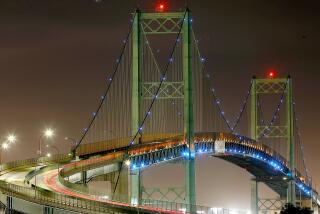Ventura Freeway Repaving Project to Begin in July
- Share via
Work crews are to begin putting down a new layer of asphalt in late July on a fast-deteriorating section of the Ventura Freeway west of Woodland Hills in the second major project to start this year on the thoroughfare, officials said Wednesday.
The $13-million project includes adding a five-inch layer of asphalt to all freeway lanes between Las Virgenes Road in Calabasas and Hampshire Road in Thousand Oaks.
All paving and lane closures will be done at night or on weekends, state Department of Transportation officials said. The westbound lanes will be repaved first, Caltrans officials said.
The project is expected to be finished by next March by contractor Kiewit-Pacific Co., of Vancouver, Wash.
In February, work began on widening the Ventura Freeway to eight lanes in Woodland Hills between Valley Circle and Topanga Canyon boulevards. The $18.3-million, 16-month project includes adding a fifth westbound lane between White Oak Avenue and Topanga Canyon Boulevard.
3rd Project
A third Ventura Freeway project is scheduled to begin in March.
That project, expected to cost $22 million and take two years, calls for the freeway to be widened to 10 lanes between the Hollywood Freeway and Topanga Canyon Boulevard.
Pavement began disintegrating along the 9-mile section of the freeway between Calabasas and Thousand Oaks about three years ago. Engineers have diagnosed the problem as “reactive aggregate,” in which highly acidic rocks, or aggregate, used in making concrete react with cement, which is alkaline.
Jack Hallin, Caltrans Southern California project development chief, said the reaction “causes the rocks to expand and then they get brittle.”
Under pressure from vehicles, he said, the stones break loose, creating small shallow holes. The holes usually show up first in the far right, or slow lane, which is used heavily by trucks.
The deterioration typically then spreads across the other lanes, Hallin said.
Gene Berthelsen, Caltrans spokesman in Sacramento, said that the only other freeway in California to suffer from reactive aggregate has been the Simi Valley Freeway, which--along with the Ventura Freeway west of Woodland Hills--was paved in the early 1970s.
Caltrans spent $5.7 million resurfacing the Simi Valley Freeway two years ago along a 7-mile stretch between Kuehner Drive and First Street.
Berthelsen said that tests to determine which rocks will lead to defective concrete recently have been perfected “so we don’t expect this to happen again.”
More to Read
Sign up for Essential California
The most important California stories and recommendations in your inbox every morning.
You may occasionally receive promotional content from the Los Angeles Times.













